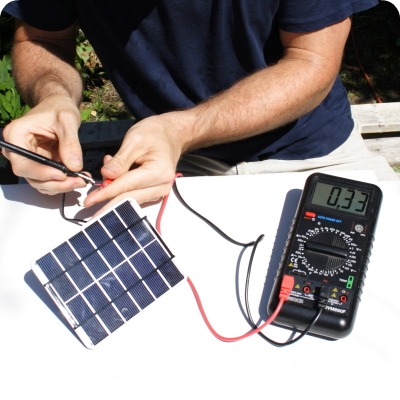When a solar panel cannot reach the standard current measured by a multimeter, several factors could be influencing its performance.
1. Light Intensity
- Sunlight Availability: The current output of a solar panel is directly proportional to the intensity of sunlight it receives. On cloudy days, or when the panel is not oriented correctly towards the sun, the light intensity decreases, leading to a lower current output.
- Shading: Partial shading from trees, buildings, or even dirt and debris on the panel can significantly reduce the current output.
2. Temperature Effects
- High Temperature: Solar panels are less efficient at higher temperatures. Although they produce more current when they get hotter, the voltage drops, which can lead to a reduced overall power output.
- Low Temperature: While solar panels perform better in cooler conditions, extreme cold can still affect performance if the panel or the connections become compromised.
3. Panel Orientation and Angle
- Orientation: The angle and direction in which the solar panel is installed affect its exposure to sunlight. Incorrect orientation can reduce the amount of sunlight the panel receives, thus lowering its current output.
- Angle: The tilt angle of the panel should be optimized for the geographic location to maximize sunlight absorption throughout the year.
4. Electrical Connections
- Loose Connections: Poor or loose electrical connections can increase resistance, reducing the current output from the solar panel.
- Corrosion: Corroded connections can also impede the flow of current.
5. Panel Condition
- Degradation: Over time, solar panels degrade and lose efficiency. This natural degradation can reduce their current output.
- Damage: Physical damage such as cracks in the panel or broken cells can severely affect performance.
6. Measurement Issues
- Multimeter Accuracy: The accuracy of the multimeter itself can affect the reading. Ensure the multimeter is functioning correctly and is properly calibrated.
- Measurement Technique: Incorrect measurement technique, such as not using proper settings on the multimeter or not making correct connections, can lead to inaccurate readings. It’s important to measure the short-circuit current (Isc) correctly by connecting the multimeter directly across the panel’s terminals.
7. Load Conditions
- No Load vs. Under Load: The current measured without a load (open-circuit) will be different from the current under load conditions. Ensure the panel is connected to a load or use a load-specific measurement technique.
8. Panel Specifications
- Mismatch with Specifications: Ensure that the expectations for the panel’s current output are realistic and based on its rated specifications under standard test conditions (STC), which typically are 1000 W/m² solar irradiance, 25°C cell temperature, and AM1.5 spectrum. Real-world conditions often differ from these ideal conditions.
9. Bypass Diodes
- Bypass Diode Issues: Bypass diodes are used in solar panels to protect against shading and to improve performance. If a bypass diode is faulty, it can affect the current output of the panel.
Diagnosing the Issue
To diagnose the issue, consider the following steps:
- Check Light Conditions: Ensure the panel is in full, direct sunlight.
- Inspect for Shading: Check for any shading or dirt on the panel.
- Verify Orientation and Angle: Make sure the panel is correctly oriented and angled.
- Examine Connections: Inspect all electrical connections for tightness and corrosion.
- Measure Correctly: Ensure you are measuring the current correctly using the multimeter.
- Compare with Specifications: Verify that your expectations are based on the panel’s rated output under standard test conditions.
By systematically checking these factors, you can identify the cause of the reduced current output from your solar panel and take appropriate corrective measures.


